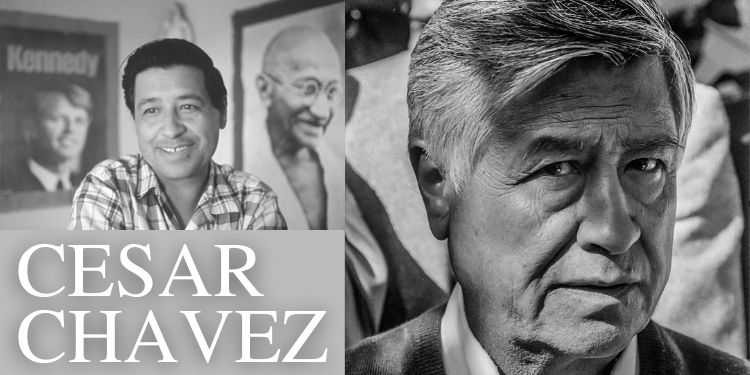City of San Antonio Celebrates and Honors Cesar E. Chavez
César Estrada Chávez (March 31, 1927 – April 23, 1993) was a Mexican-American labor leader who used nonviolent methods to fight for the rights of migrant farm workers in the southwestern USA. Migrant farm workers are people who do farm labor, moving from farm to farm and from town to town as their work is needed – it is difficult work that pays very little and can be dangerous due to the use of pesticides (pesticides are chemicals that kill bugs and can make people sick).
Chávez founded a group that advocates for the rights of farm workers, acting to increase wages and improve the working conditions and safety of farm workers. He also organized strikes (when workers refuse to work until improved working conditions and salary demands are met) and nation-wide boycotts of agricultural products in order to help workers (a boycott is a protest in which the public is asked not to buy certain products). Chávez went on many hunger strikes, refusing to eat until violence against strikers ended and until legislators (law makers) voted to make laws improving the lives of farm workers. He was also jailed many times during his fight against terrible migrant worker conditions.
Chávez and his wife taught Mexican immigrants to read and organized voting registration drives for new US citizens. Chávez was greatly influenced by the peaceful philosophy of St. Francis of Assisi and Mohandas Gandhi. He joined the Community Service Organization, an organization that worked for the rights of farm workers.
Chávez was born in San Luis, Arizona, near Yuma. His family had lived there since his grandfather immigrated from Mexico.
Chavez worked tirelessly to make a better life for not only those of Mexican descent but also for the nearly 16 million Americans currently represented by a union.
Paul Chavez says his father’s work was never about wages and conditions. It was, first and foremost, about respect. Chavez remembers following his dad to marches and boycotts. “People would work their entire lives, and when their bodies broke down and they were no longer able to work, they had nothing to fall back on,” Chavez said. “He gave hope and inspiration to people that were in short supply of it.”
Cesar Chavez became synonymous with a movement. He followed Martin Luther King, Jr.’s example and preached nonviolence. He amplified the voices of his community, both professionally and culturally. This is the Chavez who is amplified today in monuments and museums.
Since the onset of the pandemic the Cesar E. Chavez March for Justice was not held in person. It has been two years since the march happened where everyone gathered together in downtown San Antonio until this past Saturday.
Grand Marshals for the 26th annual March included the First Lady of San Antonio, Erika Prosper Nirenberg and Paul Chavez, President and CEO of the Cesar Chavez Foundation.
Visiting SAISD schools ahead of the March, Erika Prosper Nirenberg stopped by our city’s schools to read to the children about Cesar E. Chavez’ enormous legacy.
Growing up, Nirenberg’s family was a migrant working family. Visiting the schools and reading to the children is where Nirenberg hopes they learn what hard work is and means while continuing their education.
“We didn’t really know much except that, if you graduated high school, you would have a better chance. As I got older, if you graduated college, you have an even better chance,” said Nirenberg.
Starting with his father, Paul Chavez said, “San Antonio has always been a place that has welcomed the farmworker movement with open arms,” The return of the march is very exciting for him. “We can gather under the banner of my father’s legacy, march and remember him, but also celebrate the work of all the good folks of San Antonio,” said Chavez.
“As much as it was to fight for justice for all workers, it really was about reminding everyone that human beings exist and do those jobs to help us move forward in life,” said Nirenberg.
Hoping for younger generations to continue the legacy and to spread the message, Paul Chavez explained that while the march honors Cesar Chavez’s legacy it is also a bridge for the younger generations to spread his message.
“It’s that combined with continuing to go out and advocate for those less fortunate. By doing both of those things, we honor my father’s legacy in the way that he would be the proudest and most happy with,” said Chavez.
This year’s march also marks the first official San Antonio city holiday on Thursday, March 31, to honor the civil rights icon. Cesar Chavez Day, a federal commemorative holiday was initiated by former President Barack Obama in 2014.
“The fact that this is also the first year that the employees of the City of San Antonio will be celebrating Cesar Chavez Day makes it even more special,” said Paul Chavez. “It validates the work that he and so many other people did for all those years, the work that they dedicated their lives to.”





